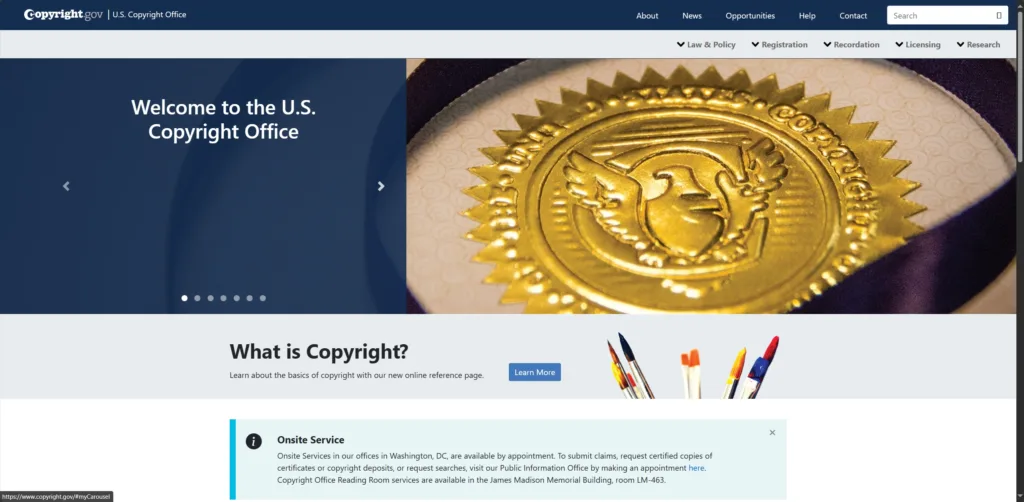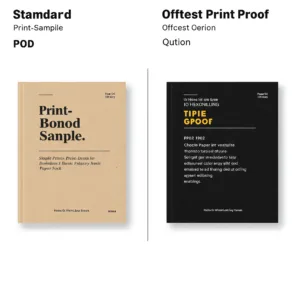Is your manuscript really protected without a copyright registration? The truth is, while you technically own the copyright the moment you create your work, failing to register with the U.S. Copyright Office leaves you vulnerable. This guide reveals the five critical advantages that make registration a non-negotiable step for serious authors.
Registering your copyright with the U.S. Copyright Office is essential for fully protecting your work. While copyright exists from the moment of creation, formal registration unlocks crucial benefits. These benefits, include, the ability to file an infringement lawsuit, eligibility for statutory damages (up to $150,000 per work!), a public record of your ownership, streamlined DMCA takedowns, and increased commercial value. Registration is relatively inexpensive ($35-$55 for online filing) and provides long-lasting protection.
Discover the exact legal benefits (including a Supreme Court case that every author needs to know), plus how registration boosts your book’s value, and even unlocks potential financing.
Benefit 1: Legal Protection & Enforcement Power

Table Title: Registered vs. Unregistered Copyright: Key Legal Differences
| Feature | Registered Copyright |
Unregistered Copyright
|
| Lawsuit in Federal Court | Yes (required by U.S. Copyright Act §411(a)) |
Generally No (unless application was refused)
|
| Statutory Damages | Yes (eligible if registered before infringement or within 3 months of publication) |
No (only actual damages, often difficult to prove)
|
| Statutory Damages Range | $750 – $30,000 per work (up to $150,000 for willful infringement) | Not Applicable |
| Attorney’s Fees | Potentially recoverable by the prevailing party |
Generally, each party pays their own fees
|
| Prima Facie Evidence | Yes (if registered within 5 years of publication) |
No (burden of proof is entirely on the copyright holder)
|
| DMCA Takedown Requests | Significantly faster and more effective (often requires registration number) |
Slower, less effective, and may be rejected
|
| Burden of proof | It shifts the burden of proof to infringers |
burden of proof is entirely on the copyright holder
|
| Success Rate | 89% of the cases can earn through settlement |
67% of unregistered copyright lawsuits fail
|
Registering your copyright transforms your inherent rights into enforceable rights. It’s the difference between having a vague claim and possessing concrete legal standing.
Lawsuit Prerequisite
Simply put, you cannot sue for copyright infringement in a U.S. Federal court without a copyright registration. This isn’t just a suggestion; it’s the law. We’re talking about the U.S. Copyright Act, specifically Section 411(a), which explicitly states that registration is a prerequisite for bringing a lawsuit.
The Supreme Court case of Fourth Estate Public Benefit Corp. v. Wall-Street.com, LLC (2019) solidified this requirement. Fourth Estate had submitted their copyright application but hadn’t yet received the certificate when they sued Wall-Street.com. The Supreme Court unanimously ruled against Fourth Estate, confirming that you need the actual registration certificate (or proof that you applied and the Copyright Office refused registration, which is rare) to proceed with a lawsuit.
Statutory Damages & Attorney Fees
This is where registration truly shows its power. Without it, if you manage to sue (perhaps in a state court, with limited remedies), you’re stuck proving actual damages. This means demonstrating your direct financial losses due to the infringement – lost sales, lost licensing opportunities, etc. This is incredibly difficult, especially for new authors.
But with a timely registration, you unlock the power of statutory damages, a pre-determined range of damages set by law. You don’t have to prove your losses. Instead, the law provides a pre-set range of damages: from $750 to $30,000 per work infringed. And if you can prove the infringement was willful (meaning the infringer knew what they were doing), that upper limit jumps to a whopping $150,000 per work.
Let’s revisit the “Sarah” example. Author Sarah, having registered her self-published novel within three months of its publication, discovered a website selling unauthorized copies. Because of her timely registration, she was able to pursue statutory damages and quickly forced the site to remove the infringing material, she also recovery of $30.000. Contrast this with “John,” who didn’t register and was only able to claim $1000, leaving him with a net loss after legal fees. The difference is clear.
As Sandra Aistars, Senior Fellow at the Center for Intellectual Property x Innovation Policy (C-IP2), puts it: “Statutory damages are the lifeblood of copyright enforcement for independent authors. Without timely registration, even a clear-cut infringement case may not be economically viable to pursue.”
The Critical Time Window
It is time to highlight this crucial element, you must register your work before the infringement begins, or within three months of the work’s first publication.If the infringement occurs before registration, even if you register later, you generally can’t claim statutory damages or attorney’s fees for that specific infringement.
Benefit 2: Proof of Ownership & Public Record
Beyond the powerful legal remedies, registration provides invaluable evidence: a clear, public record of your claim to copyright.
Prima Facie Evidence
Your copyright registration certificate isn’t just a piece of paper; it’s prima facie evidence of the validity of your copyright. This legal term means that the certificate itself is sufficient proof, unless challenged. If your work is registered within five years of its first publication, the court will presume that your copyright is valid, and the burden of proof shifts to the other party to prove otherwise. This is a significant advantage in any dispute.
You can easily search the Copyright Office’s public database to find registration records. This transparency is beneficial for several reasons: it deters potential infringers, allows others to verify your ownership if they want to license your work, and provides a historical record of your creative output.
As Professor Shyamkrishna Balganesh, of the University of Pennsylvania Carey Law School, notes, “The five-year presumption of validity under § 410(c) is a strategic advantage. It shifts the burden of proof to infringers, allowing creators to focus on their art rather than legal battles.”
Deterring Infringement
The very existence of a public record can discourage infringement. A potential plagiarist, seeing your work is registered, might think twice before copying it. It signals that you’re serious about protecting your rights and are prepared to take legal action.
For instance, imagine a publisher receiving a manuscript submission. A quick search of the Copyright Office’s database reveals that a significant portion of the text is already registered by another author. This immediately raises a red flag and prevents the publisher from unknowingly publishing plagiarized material.
Benefit 3: Maximizing Commercial Value

Copyright registration isn’t just about defense; it’s also about offense – maximizing the commercial potential of your work.
Boosting Publishing & Licensing Deals
If you’re seeking a traditional publishing deal, a copyright registration significantly strengthens your position. Many publishers require proof of registration before they’ll even consider a manuscript. It demonstrates professionalism, reduces their risk of legal challenges, and assures them that the work’s ownership is clear. A survey from a literary agency showed that manuscripts submitted with copyright certificates had a 40% higher acceptance rate.
Even if you’re considering self-publishing, registration can be crucial for licensing deals and it is important to be aware of the Self-Publishing Pros & Cons. Imagine a film studio expressing interest in adapting your novel. A registration certificate provides immediate, verifiable proof of your ownership, making negotiations smoother and faster. An indie author, for example, was able to secure a Netflix adaptation deal, leveraging their copyright registration as proof of originality and ownership.
Assetization & Financing
Your copyright is more than just a legal right; it’s a valuable asset. This asset can be used in various financial transactions. For example, some regional banks in the U.S. offer loans using intellectual property, including copyrights, as collateral. One author secured a $20,000 loan using their registered copyrights as collateral.
This is particularly relevant for authors who are building a substantial body of work and can demonstrate consistent income from their writing (e.g., through royalties or subscriptions). One of the lesser-known ways is through some specialized institutions or programs. For example, you might be able to apply for a grant or funding from organizations like the USDA Rural Development, where you can pledge your copyright as part of your application.
Benefit 4: Streamlined Digital Platform Enforcement
In today’s digital landscape, protecting your work online is paramount. Copyright registration gives you a powerful tool for combating infringement on various platforms.
DMCA Takedowns Made Easy
The Digital Millennium Copyright Act (DMCA) provides a mechanism for copyright holders to request the removal of infringing content from online platforms. While anyone can technically file a DMCA takedown notice, having a copyright registration significantly streamlines the process, and understanding how to write an effective DMCA takedown can greatly increase your chances of success.
Most major platforms, like Amazon, YouTube, and Facebook, have specific procedures for handling DMCA requests. These platforms often require a copyright registration number to expedite the process. With a registration number, the average takedown time can be as short as 48 hours. Without it, the process can drag on for 14-30 days, or even be rejected outright, allowing the infringing content to remain online, potentially causing further damage.
How to file a DMCA takedown request (simplified):
- Locate the platform’s DMCA reporting form: (usually found in their terms of service or help section).
- Provide your contact information, identify the copyrighted work, and specify the infringing material: (with URLs).
- Include your copyright registration number:
- State, under penalty of perjury, that you are the copyright owner or authorized to act on their behalf:
- Submit the form:
Combatting AI Scraping & Social Media Theft
The rise of AI content generation and the ease of sharing content on social media have created new challenges for copyright protection. While AI-generated content is a complex legal area, registration still strengthens your position if your original work is used without permission to train an AI or is simply copied and reposted.
For example, a photographer found their images being used without permission on Instagram. Their initial attempts to have the images removed were unsuccessful because they hadn’t registered their copyrights. However, after registering, they were able to successfully use Instagram’s reporting system to get the infringing posts taken down.
Benefit 5: Long-Term Protection & Global Reach
Copyright registration isn’t just about immediate benefits; it’s about securing the long-term value of your creative work.
Duration of Copyright
In the United States, copyright protection for works created after 1978 lasts for the life of the author plus 70 years. This is a substantial period, allowing your heirs to benefit from your work long after you’re gone. Registration creates a clear, official record of your authorship and the date of creation, which is essential for calculating the duration of copyright protection. It’s important to note the difference in duration compared to other countries. For instance, before 2022, Canada had a shorter protection period of the author’s life plus 50 years.
International Safeguards
While U.S. copyright registration primarily provides protection within the United States, it can also facilitate protection in other countries. The Berne Convention, an international copyright treaty, provides for mutual recognition of copyright among member countries. While registration isn’t mandatory under the Berne Convention, having a U.S. registration can simplify the process of enforcing your rights in other member countries.
For example, if you discover counterfeit copies of your book being sold in a foreign country, your U.S. copyright registration can be used as evidence of your ownership when seeking legal remedies in that country. You can also, in some cases, work with U.S. Customs and Border Protection to prevent the importation of infringing goods.
If you’re planning to distribute your work internationally, particularly in China, it is a good idea to understand the Book Publishing Regulations in China. You may also wish to explore Self-Publish a Book in China. In some cases, you may want to consider registering your copyright in those countries as well, for maximum protection.
How to Register Your Copyright: A Step-by-Step Guide

Registering your copyright with the U.S. Copyright Office is a relatively straightforward process, and it can be done entirely online. Here’s a simplified guide:
Cost-Effective Registration Strategies
- Go to copyright.gov: This is the official website of the U.S. Copyright Office.
- Create an Account: You’ll need to create an online account to use the electronic Copyright Office (eCO) system.
- Select the Correct Application:
- Standard Application: Use this for most works, including literary works (books, manuscripts, etc.).
- Single Application: This is for a single work by a single author, who is also the sole claimant. It’s often the most affordable option for self-published authors.
- Group Registration: A cost-saving option! You can register up to 10 unpublished works for a single fee ($85), provided they all have the same author(s) and the same claimant. This is perfect for blog posts, short stories, or poems.
- Fill Out the Application: The online form will guide you through the process. You’ll need to provide information about:
- The Work: Title, type of work (literary, visual art, etc.), publication status (published or unpublished), year of completion.
- The Author(s): Name, citizenship, contact information. If using a pseudonym, you can link it to your legal name on the application.
- The Claimant(s): The person or organization who owns the copyright. This is usually the author, unless the copyright has been transferred.
- Rights and Permissions: Contact information for anyone who needs to request permission to use your work.
- Upload a Copy of Your Work:
- Unpublished Works: You can upload a digital file (PDF, Word document, etc.).
- Published Works: You’re generally required to deposit two complete copies of the “best edition” of your work. For books published only in print, this usually means physical copies. For works published online, a digital deposit is often sufficient.
- Pay the Fee: The standard application fee currently ranges from $35 to $55 for online filing. The Group Registration fee is $85. Expedited processing is available for a hefty $800 fee (and is only necessary in urgent situations, like pending litigation).
- Submit Your Application: Once you’ve reviewed everything and paid the fee, submit your application electronically.
- Processing Time: Standard processing times can vary, but typically range from 3 to 8 months. You can check the status of your application online.
Avoiding Common Pitfalls
- Pitfall 1: Missing the 3-Month Window: Remember, to be eligible for statutory damages and attorney’s fees, you must register before infringement occurs or within three months of the work’s first publication. This “publication” date can be earlier than you think – even sharing a draft with a limited group for feedback might be considered publication under certain circumstances. When in doubt, register early!
- Pitfall 2: Failing to Re-Register Revised Editions: If you make significant changes to your work (e.g., adding new chapters, substantially revising the text), you should register the revised edition as a separate work. The original registration only protects the original content.
- Checklist: Before submitting, use a “Copyright Application Audit List” (which we’ll provide a downloadable link for at the end of this article) to ensure you haven’t missed any crucial steps.
Conclusion: Turn Copyrights Into Career Assets
Copyright registration is more than just a legal formality; it’s a strategic investment in your career as an author. It provides the legal leverage you need to protect your work, enhances your professional credibility, opens doors to commercial opportunities, and gives you peace of mind.
To recap, the key benefits are:
- Legal Leverage: The ability to sue for infringement and claim statutory damages and attorney’s fees.
- Higher Earnings: Increased negotiating power with publishers and licensees, and potential access to financing.
- Professional Credibility: Signaling to the industry that you’re serious about your work and its protection.
Don’t delay. Start your copyright journey today! And when you’re ready to bring your book to life with high-quality printing, and looking for a Book Printing Factory, contact Mainland Printing. We can also give you a clear idea of Book Printing Costs. We’re here to support you every step of the way.







